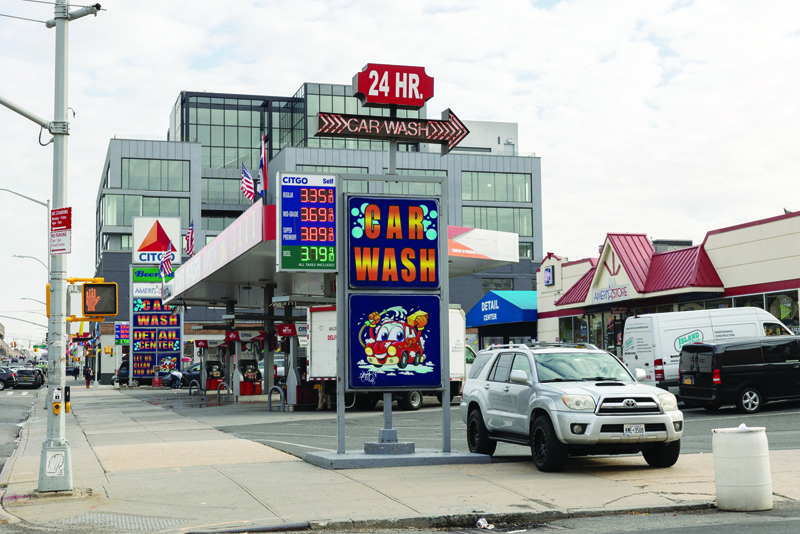 QUEENS, US: The price of gasoline is displayed at a gas station in Queens, New York on Friday.-AFP
QUEENS, US: The price of gasoline is displayed at a gas station in Queens, New York on Friday.-AFP
WASHINGTON: Standing with the pump in her hand, Telila Scott was stunned to see the price of gas in Washington-a sentiment many are feeling as costs rise across the United States. "This is outrageous," said Scott, who is currently unemployed. "I'll pay $20 to try to fill my tank back up, but it still doesn't fill it." Data released Friday showed an average rise of 6.8 percent across the United States over last year's prices, the largest increase since June 1982. "You go to the store," she said, "and it's bad-bread, sugar, everything is so high!" Next up at the gas station-where regular gas is $3.39 a gallon-Earl Walker also finds it more and more difficult to fill his black pickup truck.
"Sometimes I can't get to work," lamented the 40-year-old community worker. "I can't fill my tank right now-it'd be over $100." According to the latest figures released, energy prices represented the largest increase (up 33.3 percent), as is the case in many other countries. The report contained signs that the inflation wave may be reaching a crest, but it nonetheless poses a political liability for President Joe Biden and the Democratic party.
A more 'frugal' shopper
On his way out of a Wal-Mart, just down the street from the gas station, Edward Harrison explains how he has become "more of a frugal" shopper. An electronic technician, he said that he now eats out less, has started looking for sales and-if necessary-will buy used items. Abby Mitchell, a 29 year old clinical researcher has also become a more conscious shopper: "If I needed a bag of spinach, I would grab a bag without looking at the price-now I'm cross comparing between different brands."
"I focus more on the value packs, to put in the freezer," said Stephen Keil, a 30-year-old working in government relations. For him, the price increases are real but "incremental-you don't notice it until you're looking at your statement later on." The question for Biden is whether Americans nationwide will blame him for the higher prices. At least in Washington, a Democratic stronghold, Keil struck a tolerant note. "Everything is COVID-induced," he said. "Sometimes there is not a lot the administration can do."
Test for Biden
US consumer prices rose last month at a rate not seen in nearly 40 years, the government reported Friday, underscoring how inflation threatens the world's largest economy and President Joe Biden's public support. The Labor Department's consumer price index (CPI) jumped 6.8 percent compared to November of last year, its biggest gain since June 1982 as prices for gasoline, used cars, rent, food and other goods continued to climb.
While the report contained signs that the inflation wave may be reaching a crest, it nonetheless poses a political liability for the president, with the Republican opposition using it to argue against his economic policies. Biden countered that the report did not encompass recent declines in prices of energy and used cars-two main drivers of the high inflation readings seen this year-and that supply chain issues which have driven prices higher are being resolved.
"Today's numbers reflect the pressures that economies around the world are facing as we emerge from a global pandemic-prices are rising," Biden said in a statement. He added that "price and cost increase are slowing, although not as quickly as we'd like," but later acknowledged inflation was "a real bump in the road." Top Senate Republican Mitch McConnell blamed the White House for the price spikes, saying that the data "confirm what every American family already knows: Inflation is out of control on the Democrats' watch."
Biden made fighting inflation a top priority last month after the CPI in October saw its sharpest annual increase since 1990. That surprised analysts and gave Republicans ammunition to use against Biden's landmark Build Back Better plan, which would spend $1.8 trillion on improving social services and fighting climate change but faces a tough road in Congress, which his Democrats control by a narrow margin. A variety of factors have caused the price increases, including shortages of components and workers, high demand for goods and rebounds in industries that were disrupted by the Covid-19 pandemic but are now recovering with the help of vaccines.
The degree to which Biden deserves blame for the inflation spike is the subject of debate. Mickey Levy, chief economist covering the Americas and Asia at Berenberg Capital Markets, pointed to the supply bottlenecks, the Federal Reserve's low interest rate policies and pandemic recovery legislation enacted under Biden and his Republican predecessor Donald Trump.
"The Biden administration fears the negative political fallout of the impact of higher inflation on households and is trying to defer the blame on special factors," Levy said. The White House has argued that its actions helped get the country back on its feet after last year's economic collapse, citing steady declines in the unemployment rate and the number of people filing for jobless assistance.
At the peak?
Some of the high inflation readings have stemmed from price increases for commodities like oil, which went negative last year at the nadir of the downturn but have risen as worldwide demand recovered in 2021. That has pushed gas prices higher in the United States, but they have started to dial back in recent weeks. - AFP
.jpg)



